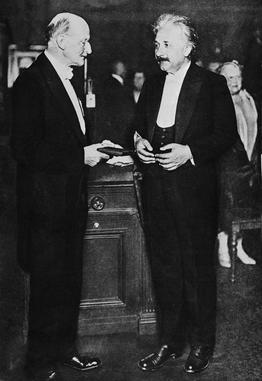
The Max Planck Medal is the highest award of the German Physical Society (Deutsche Physikalische Gesellschaft), the world's largest organization of physicists, for extraordinary achievements in theoretical physics. The prize has been awarded annually since 1929, with few exceptions, and usually to a single person. The winner is awarded with a gold medal and hand-written parchment. [1] [2] [3]
Contents
In 1943 it was not possible to manufacture the gold medal because the Berlin foundry was hit by a bomb. The board of directors of the German Physical Society decided to manufacture the medals in a substitute metal and to deliver the gold medals later. [4] [5]
The highest award of the German Physical Society for outstanding results in experimental physics is the Stern–Gerlach Medal. [6]